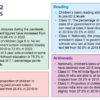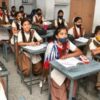Current Issue
From the Archives
Artificial intelligence: Leapfrog opportunity for Indian education

Media Bytes
“Let me be blunt. The draft is ludicrous. There is no other way to put it. It reads like something designed not for students, but for a committee room high on civilisational nostalgia and low on pedagogical reality. There is a charming belief running through it — that if you rewrite the curriculum with enough ornamental references to “ancient Indian knowledge systems,” the classroom will somehow fix itself. That logic is right up there with believing that wearing running shoes will make one an Olympic sprinter”
— Anuradha Rao—Learning & Development professional in The Perfect Voice, (22/10)
“On October 10 every year, World Mental Health Day highlights the extent of mental illness in the world – over one billion people (13 percent of global population) suffering from mental illnesses. India is a part of this, with a 13.7 percent lifetime prevalence of mental disorders in the country.”
— Samayeta Bal, The Hindu, (10/10)















Add comment